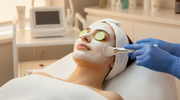Can make-up really benefit your skin?

While several make-up products contain actives or a botanical ingredient, do such formulations hold any merit?
It’s not new news that make-up and skincare share a deep-rooted connection—every professional make-up artist you meet will vouch for this. The last few years have seen an ingenious category of products—make-up and skincare hybrids. From IT Cosmetics’ CC+ Cream Full-Coverage Foundation to Clinique’s Even Better All-Over Concealer + Eraser, Chanel’s N°1 de Chanel Lip and Cheek Balm to Forest Essentials’ Lip Serums, a bunch of global bestselling make-up products contain skin-loving ingredients. In fact, hybrid formulations are the foundation for a slew of recently-launched brands—both homegrown and international—like asa Beauty, Daughter Earth, Color Chemistry, Ilana and so forth. Internationally, brands like Milk Makeup, ILIA, Kosas picked up on the trend slightly earlier, in the mid-2010s.
THE RISE OF SKINCARE-INFUSED MAKE-UP
The ‘skinification’ of make-up isn’t an entirely novel concept, share two dermatologists, Dr Jushya Sarin, co-founder, Sarin Skin Solutions and Dr Geetika Mittal Gupta, founder, ISAAC Luxe. “Hyaluronic acid has always been present in hydrating primers and liquid foundations. This molecule is employed for its ability to provide a plump and dewy look to the skin. Even vitamin C has been added to BB and CC creams, but in a lower percentage, to provide some added benefit without irritating your skin,” says Sarin.

All of Type Beauty's offerings champions hybrid formulations; they offer four different active-infused foundations to cater the needs of various skin types

The make-up range from Forest Essentials features Ayurvedic—not active—ingredients like ghee, Kasturi Manjal, sweet almond oil and sandalwood to perfect the skin inside-out
For Mittal Gupta, it’s not the presence of active ingredients but the change in their concentrations in the formulations of make-up products that is a differentiating factor. “Today, make-up formulations are fortified with effective quantities of synergistic active ingredients to provide additional benefits,” she mentions.
At Clinique, hybrid formulations have been an integral part of the brand’s philosophy. “Everything we know about skincare goes into our foundations and colour products,” says Ranadeep Singh, educator at Clinique. “When we work with our chemists to develop a make-up product with skincare benefits, our approach is to reverse engineer—build the formulation like a skincare product first, and then add the colour components,” furthers Singh. Besides infusing active ingredients into the product’s mix, the age-old practice of preparing cosmetics with botanical ingredients has taken centre stage once again. “Indians, for centuries, have used kohl and henna as part of their beauty rituals,” apprises Dr Taruna Yadav, senior Ayurveda doctor at Forest Essentials. “Nourishing and hydrating ingredients like aloe, green tea extract and jojoba oil have always been incorporated in more contemporary formulations, but are not spoken about enough. It is only recently that there has been a resurgence in the popularity of promoting natural and organic ingredients in make-up,” believes Yadav.
CAN HYBRIDS SUBSTITUTE SKINCARE?
Love it or hate it, skinimalism is all the rage at the moment. A slew of brands like Bobbi Brown-owned Jones Road is shifting their focus entirely on creating products that hallmark the ‘skincare meets make-up’ promise. Niacinamide-infused primers, hyaluronic acid-infused complexion enhancers and SPF-infused base make-up are emerging ass go-to picks for most beauty enthusiasts.The question then, is, are these products efficient and effective enough to toss serums and sunscreens to the backseat? By no means. “Make-up is not meant to penetrate deep enough into the skin where the active ingredients can really be effective and shine,” dermatologist Corey Hartman told The Strategist. “Not only that, but active ingredients in make-up rarely reach therapeutic levels that will render them completely sufficient to treat any skin condition on their own.”

With a complex of three promising actives namely vitamin C, salicylic acid and hyaluronic acid, this serum foundation offers care and colour—both at once. Image: Instagram.com/cliniquein
Sarin thinks the efficacy of the actives largely depends on the ingredient in question. “Moisturising ingredients like ceramides, colloidal oatmeal, hyaluronic acid, glycerine and aloe vera are always welcome,” she says. However, if you’ve been wondering whether SPF-infused foundations and CC creams are tantamount to sunscreen, “SPF in make-up products is not something I’d rely on,” shares Sarin. “They are inefficient since we’ll never apply make-up in the amount we’d like to apply our sunscreen, which needs to be reapplied, in the same amount, every 2-3 hours, which is impractical with make-up. It’s also suggested to be alert about the presence of alpha hydroxy acids like glycolic acid since it might not suit all skin types. However, salicylic acid in foundations would help acne-prone skin by preventing pore-clogging,” adds Sarin.
“IT IS ALSO ESSENTIAL TO UNDERSTAND THAT ACTIVE INGREDIENTS IN MAKE-UP ARE GOOD FOR PROTECTION RATHER THAN REPAIR BECAUSE OUR SKIN NEEDS PROTECTION DURING THE DAY AND REPAIR DURING THE NIGHT”Dr Geetika Mittal Gupta
While Mittal Gupta does believe that hybrids make for a functional choice in a world where one struggles to spare time for an elaborate beauty regimen, she also says that a layer of caution is advisable as skincare actives may not be able to perform under blanket conditions in all products. “The key to knowing which ones will work stems from understanding the purpose of these ingredients in make-up. It is also essential to understand that active ingredients in make-up are good for protection rather than repair because our skin needs protection during the day and repair during the night. Since people wear make-up for long hours during the day, the addition of antioxidants and anti-pollution agents is helpful.”

Smart packaging and good-for-your ingredients make asa Beauty's make-up is skin-loving and environment-friendly Image: Instagram.com/asabeauty

Trust this liquid lipstick to be your BFF, from AM to PM, courtesy of its long-lasting yet lip-caring formula with avocado and apricot oil Image: Instagram/kirobeauty
WAYS TO IDENTIFY EFFICACIOUS PICKS
While picking products, analysing the ingredients is then key. “Hybrid formulations work better than conventional make-up products. Research has shown that make-up products can have a lasting positive impact on your skin. And so, make-up products with skincare benefits are an excellent complement to a high-powered skincare regimen,” says Singh. Talking about Clinique’s products, he adds, “When it comes to incorporating skincare ingredients into make-up formulations, we ensure the actives are compatible with the base and deliver efficacy to the skin, instantly and in the long term. The products are clinically tested to validate the benefits of both skincare and make-up performance.”
Meanwhile, Yadav lets us into the workings of Ayurvedic make-up. “The efficacy of ingredients once incorporated in make-up, is dependent on the concentration and the stability of the ingredients. Ayurvedic antioxidants like ashwagandha or amla extract, and hydrating ingredients like glycerin, honey and aloe, can provide skincare benefits while offering the coverage when put into make-up formulations,” she says. “It is important to note that the efficacy of these ingredients in make-up products will not be as potent as in dedicated skincare, since they are not formulated to replace your skincare routine,” says Yadav.
SHOULD YOU INVEST IN SKIN-IFIED MAKE-UP?
Skincare and make-up hybrids are omnipresent, with claims that might sound lucrative and realistic at the same time. That being said, one cannot entirely substitute such products for their everyday skincare routine. Sarin says, “If you have skin concerns to deal with, I’d rate them [hybrids] higher than conventional products. However, if you have normal skin with no active concerns, why pay more for skin care actives in your make-up?”

This foundation from Neutrogena bets on the power of niacinamide to keep your skin barrier fortified and your skin looking healthy Image: Instagram.com/neutrogena
Echoing Sarin, Yadav states, “Skin-ified makeup is not necessarily a requirement, but can definitely help those with a tendency to have breakouts and clogged pores. It prevents stripping your skin of its natural moisture when formulated with hydrating ingredients.” The excerpts were in favour of formulations that feature failproof ingredients like hyaluronic acid, vitamin C, Centella Asiatica, salicylic acid (for acne-prone skin) and other moisture-boosting ingredients. Mittal Gupta gives a quick heads-up for those with sensitive skin, “Sensitive skin types should always be wary of the combination of ingredients used in the hybrid make-up product they’re looking to buy; they should not use anything before consulting a dermatologist.”


